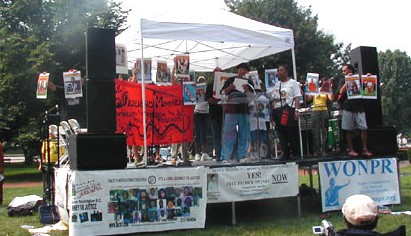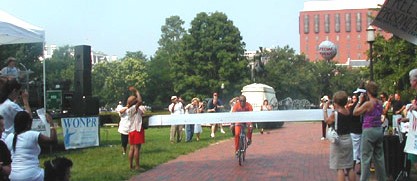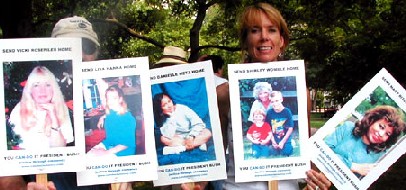Feature:
DC
"Two
Million
is
Too
Many"
Prison
Rally
Lays
Groundwork
for
More,
Better
Collaboration
8/19/05
Roughly a thousand people showed up in Lafayette Park across from the White House in Washington, DC, Saturday for the first national rally aimed at ending this country's reliance on mass incarceration and obtaining better treatment for those behind bars. While the numbers were relatively small, the protest could mark an important step in bringing together a more unified movement calling for fundamental reforms of the nation's criminal justice apparatus.
For those who persevered and arrived at Lafayette Park on Saturday morning, it was not so much the Promised Land as the inferno, with Washington's notoriously steamy summer weather living up to its reputation. As sweating speakers orated in the blistering sun, demonstrators sought shelter beneath the shade of trees. But the rhetoric was as hot as the temperature as speaker after speaker blasted the system that makes America the most prison-friendly country in the world. Roberta Franklin told the crowd how her crusade began with letters from women inmates in Alabama complaining about their lack of medical care. The letters and her involvement with the lawsuit that arose from them opened her eyes to the injustice of the system, she said. "I used to believe in this system," Franklin said. Now, she said, "it's my belief when good people... hear the story of America's prisons, they'll be disgusted." Eric Sterling, executive director of the Criminal Justice Policy Foundation shared with the crowd some perspectives on movement building. "We are already well along in building a movement," he said, "and we need to understand what it is we are trying to do. We want to appeal to the vast mass of Americans because they will ultimately be the political support we need for the changes we want. If we do not do that, we will not succeed. We need to appeal to the common values of the American people, the things we all believe in, like fairness, equal opportunity, strong families, redemption. What we are trying to do is win over the American people," Sterling insisted. Part of the movement's job, said Sterling, is to demolish the myths that power-holders use to maintain the status quo. "There is the myth that long sentences reduce crime through deterrence, but they don't -- they only destroy families. There is the myth of country club prisons, where in truth the prisons are unsafe and dangerous, with inadequate health care and rife with violence," Sterling said as part of lengthy list of such myths. Bryan Stevenson, an attorney who heads the Equal Justice Initiative of Alabama, excoriated tough sentencing policies. "We've represented dozens of people sentenced to life in prison without parole for stealing a bicycle, writing a bad check or simple possession of marijuana. And it's that kind of sentencing policy that has resulted in the prison population growing from 200,000 to two million in the last 30 years," he told the crowd. "I was proud of what we accomplished," Franklin told DRCNet. "A lot of prisoners' family members got some hope. That's important. But there were also alliances made. We had a real mixture, we had people there on behalf of those physically abused and medically neglected in prison, we had death penalty people, we had people representing political prisoners, we had the drug people," she said. "I will say this for prisons and the criminal justice system: They present so many issues you can form alliances around."
During his Saturday speech, Jones challenged black ministers to hold politicians accountable. "If a politician wants to speak in your church, you should check his voting record," Jones said. "Is he the same person who voted for those mandatory minimum sentences that are destroying black neighborhoods?" If so, Jones said, maybe the church should not implicitly endorse him by allowing him to use its pulpit as a platform. As a correctional officer, Jones got to see the human face of the drug war close up. "We've been fighting this drug war for 20 years and they haven't put a dent in the drugs. They came out with the mandatory minimums to get the so-called kingpins, but it's the low-level guys -- and their girlfriends -- who get locked up," he said. "I want to go back into those prisons with a message of hope and to tell those prisoners to start writing their congressmen about the parole bill. That bill offers hope for the prisoners, and that makes for a better, safer environment inside the prison -- for the prisoners, for the guards, and for the smooth running of the institution." "I'm not disappointed in the turnout," said Franklin. "The crowd in Washington tells me we could accomplish a lot more if we had more money and more support. Generally, these national demonstrations have big money behind them, but we didn't have any money. Everybody who was there was there on their own dime. This was a real grassroots movement," she said. "What I was disappointed about was the lack of support from some of the major groups that claim to speak for prisoners. Some of them wouldn't even put out the word for the march on their web sites. I thought that showed a real lack of a spirit of camaraderie. Some people are scared of us. They call us radicals. When did radical become a bad word?" "Unfortunately, sometimes the reformers fail and we saw that in part in Washington Saturday," said Sterling. "Most of the reform organizations failed to provide any meaningful support for the demonstration." "There were more than a thousand people who wanted to be there bad enough to pay their own money," said Franklin. "Imagine what we could have done if we had had the money to do mass mailings to get the word out. You know, I'm sick of going to conferences and hearing the same people say the same things and in the meantime, the prisons are getting fuller. We've had enough conferences. We know what the problem is. Now, it's action time." As is to be expected in a movement encompassing diverse elements -- prison reformers and prison abolitionists, people interested in drug policy and people interested in prison health care -- there was little agreement on ultimate solutions. But there was agreement on working together despite differences. "We were not going to let our differences divide us," said Nora Callahan, executive director of The November Coalition, a group advocating for freedom for drug war prisoners. "I think the drug people and the prison people really came together in Washington," said Dean Becker of the Drug Truth radio network. "They all really seem to get it. They see it's going to require a combination of forces to get it done," he told DRCNet.
Plans are already afoot to turn Saturday's rally into the basis for continuing collaboration among the various groups represented in Washington. "We are trying to form a national committee with representatives from each state," said Franklin. "If we can become a true national movement, we can start to have an impact on things." One possible action, Franklin said, was a national boycott of prison phone lines, whose extremely high rates led to charges of gouging what is literally a captive market. "If we got all the men and women to stay off the phones, maybe we could get some justice," she mused. "And it's something that both families and prisoners can participate in." Some participants in the Saturday rally are already expressing interest. "If I'm invited, I'd like to participate as a regional organizer," said Julie Mormando of the JusticeWorks Community in New York City. "This is a grassroots movement largely organized by the people directly impacted, but they want to garner representatives from different states and cities, and when that happens, New York will be represented for sure," she told DRCNet. "This is the beginning of a much, much broader movement." That it is time to forge a broader coalition was a common notion. "Now we need to begin coming up with a common vision of a strategy for raising this issue to the level where the public becomes aware of the impact that this country's criminal justice policies are having," said Joseph "Jazz" Hayden, campaign director for Unlock the Block, part of the nationwide Right to Vote campaign, an effort to restore voting rights to people with felony records. Hayden helped organize two busloads of protestors from New York City for Saturday's march. "There will be another march," said Callahan, "and it won't be in August and Congress will be in session. We are looking at September 2006, we have already begun forming a working committee, and having a year to organize gives us time to create local activity that will bring progress long before we join together again. The first time I went to DC on a Journey for Justice there were 60 people. This time, there were 1,200. Next time, let's have 250,000." It might take more than a year to pull that off, suggested Sterling. "I'm not sure doing this on an annual basis makes the most sense, but there is no question there is a role for mass rallies," he said. "Clearly, though, we're not yet at the stage where we can organize the kind of huge mass rally that makes the history books. Those take enormous resources, but whether that is the tactic for this particular stage is something we need to think about." With a first national committee meeting set for October, Franklin said the nascent coalition is looking to develop an alliance that can get things done. "We want that parole bill passed, that would be a terrific accomplishment," she said. The crusade started in Montgomery appears to have created some ferment and awareness among the diverse groups working prison issues in relative isolation, and Franklin is getting set to keep stirring the pot. "You haven't seen the last of me," she warned.
| |||||||||||||||||||||||||||||||||||||||||||||||||||||||||||||||||||||||||||||||||||||



